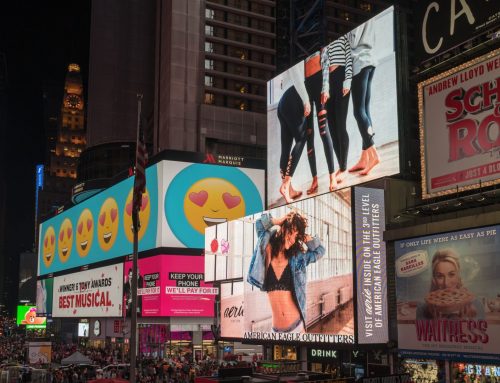5 Things Advertisers Can Learn From TV To Become Better Advertisers
At the end of the day, television is mostly pure advertising—so why not learn from it? TV shows consist of tools, secrets, and techniques that we can steal to increase our own success in advertising.
- Go With The Flow
Shows with live audiences are typically completely live and streamed 90% in the moment. There are some rare cases where “live” shows are pre-recorded and streamed at a different time, but the scenes remain intact and the essence of the live audience is still there.
What we, as advertisers, can learn from live audience shows is how to manage uncertain situations. Even when they know how the program must run and the people on the shows have rehearsed, there is always a chance that something could go wrong, because it’s live. Like, an unexpected question could come from the audience or mishaps with the audio for the show could occur. Every person principally on the show must have skills to solve unexpected problems and improvise in a professional way to make sure the show is a success.
This is useful for advertising, since a lot of times we cannot control the way projects are going and we have to adapt, volute, and solve in the moment without losing our credibility.
- Overselling
Some people consider sports shows and news shows to be basically the same—but they’re really not. If we pay close attention to sports shows and news shows, they do have something in common… can you guess what it is? No, it’s not the handsome reporters. It’s something the shows are specifically doing: the way sports shows communicate sports is a technique that is appealing to audiences and engaging. Reporters on sports shows exaggerate every event and they modulate the tone of their voices to make it all sound way more exciting than it is, because let’s be real, sports aren’t that exciting.
This manipulation makes audiences have feelings like excitement, anger, and sadness. The goal of the reporters’ is to make audiences feel like they, as spectators, are a part of the game—like they are the family of the sports player or are in the studio with the reporters.
This exaggeration technique is useful to us in advertising, because it helps us learn how to create conversation and loyalty with audiences. Exaggeration is in many ways a double weapon. The audience can believe and engage with what you tell them or they could understand that what is being said is exaggerating and find it funny or clever—either way, exaggeration results in positive reactions from audiences.
- Feel Like Home
In reality shows we pay attention not only to the host, but to the whole show structure. How do they make the audience want to know what is going to happen in next episode? They use an intriguing tone to make audiences wonder what is going on and what will happen next.
These kinds of shows drive audiences to the edge of their seats and then, in the last minute of the show, they drop a “WOW” bomb. Audience members get a shock, like something happens that they did or didn’t want to happen. Then, audiences can’t stop watching. Reality shows have a minimum of 5 episodes and they often have spin-off shows if the shows are successful.
Make notes how to drop that bomb to clients or even in the project itself. To keep your audience wondering what is going on, what is going to happened next. This will also get you loyalty in a medium – long period term. Some strategies based in this type of communication could be awareness campaigns that can be easily distributed in at least 3 phases, then leading to an informative campaign finalizing with a call to action campaign. That way the audience is kept captive and interested.
- Drama Queens
With novellas and series, the secret to their success is the background knowledge that their audiences have. To people unfamiliar with shows like this, it may always seem like random topics, but there is a specific feeling that they aim to create within their audiences. Everybody has different thoughts and our life experiences are different, but novellas and TV series can adapt similar situations in a way where we all feel connected to the show in some way.
As an advertiser, you have to research your target audience deeply. Pay attention to the tribes and deliver a profile. Talking specifically of this drama queen programs lifestyle is a trend around them, they attempt to make you feel related with the protagonist or antagonist and that is what engages the audience. This programs usually include a lot of drama and emotion changing this tactic is useful because when you remind people they have feelings you are creating a bond at the same time that could help you win their loyalty or preference. For advertising it is the same, appealing life experience with a little (or maybe a lot) of drama and your audience will relate and feel part of your project or campaign.
- Sneaky and Lethal
We can find a lot of infomercials on TV mostly at midnight. They do not require a lot of attention, but they focus on selling the audience stuff that they probably do not need at all. But, the success of infomercials is based on the way they talk and communicate features of products, in addition to the benefits of products. They make viewers feel like we need whatever they are selling. This is advertising. We, as advertisers, must be able to trick minds into thinking they need what we are selling. One important thing we shouldn’t forget is that audiences do not have to notice that we plant new ideas in their brains—it should feel natural.
What to Take Away
After talking about the 5 different types of TV shows, we can conclude that the main thing advertisers can take away from TV shows is the knowledge of how audiences behave. Different techniques aim to achieve different reactions. It’s important to know the audience you are speaking to so a dialogue can be established between every party. Pursue the goal you want to accomplish. It could be a long-term relationship, loyalty, call-to-action, sales, or whatever. All of these goals are directly related to audience.
Written By: Ornella Poumian





